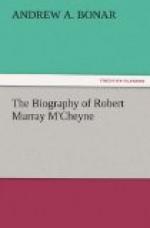An event occurred the week before which cast a solemnizing influence on him, and on his after fellow-traveller and brother in the gospel, who was licensed by another Presbytery that same day. This event was the lamented death of the Rev. John Brown Patterson of Falkirk—one whom the Lord had gifted with preeminent eloquence and learning, and who was using all for his Lord, when cut off by fever. He had spoken much before his death of the awfulness of a pastor’s charge, and his early death sent home the lesson to many, with the warning that the pastor’s account of souls might be suddenly required of him.
On the following Sabbath, Mr. M’Cheyne preached for the first time in Ruthwell Church, near Dumfries, on “the Pool of Bethesda;” and in the afternoon on “the Strait Gate.” He writes that evening in his diary: “Found it a more awfully solemn thing than I had imagined to announce Christ authoritatively; yet a glorious privilege!” The week after (Saturday, July 11): “Lord, put me into thy service when and where Thou pleasest. In thy hand all my qualities will be put to their appropriate end. Let me, then, have no anxieties.” Next day, also, after preaching in St. John’s Church, Leith: “Remembered, before going into the pulpit, the confession which says,[5] ’We have been more anxious about the messenger than the message.’” In preaching that day, he states, “It came across me in the pulpit, that if spared to be a minster, I might enjoy sweet flashes of communion with God in that situation. The mind is entirely wrought up to speak for God. It is possible, then, that more vivid acts of faith may be gone through then, than in quieter and sleepier moments.”
[5] He here refers to
the Full and Candid Acknowledgment of
Sin, for Students
and Ministers, drawn up by the Commission of
Assembly in 1651, and
often reprinted since.
It was not till the 7th of November that he began his labors at Larbert. In the interval he preached in various places, and many began to perceive the peculiar sweetness of the word in his lips. In accepting the invitation to labor in the sphere proposed, he wrote: “It has always been my aim, and it is my prayer, to have no plans with regard to myself, well assured as I am, that the place where the Saviour sees meet to place me must ever be the best place for me.”




